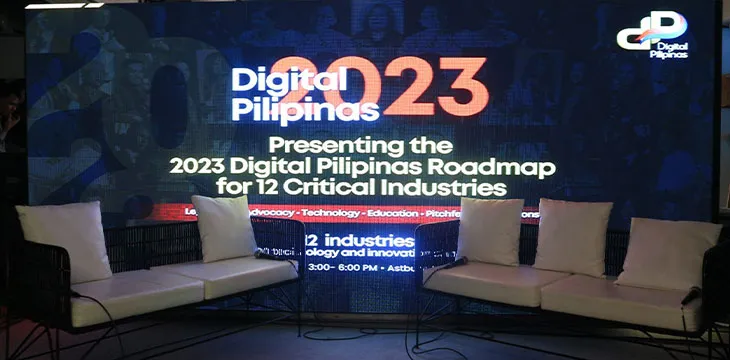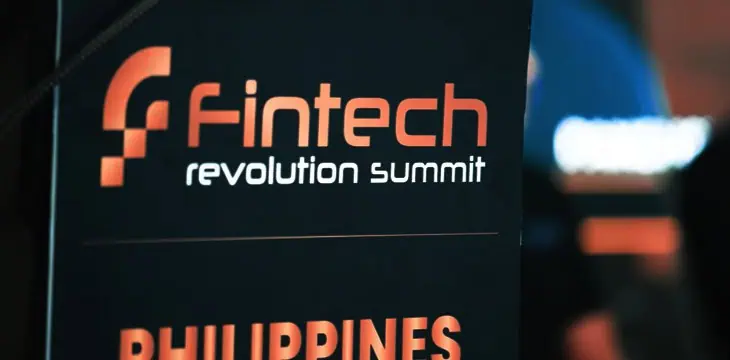|
Getting your Trinity Audio player ready...
|
Who says 2023 isn’t a year of innovation and development in the finance sector and other industries in the Philippines? Not Digital Pilipinas, as they tackled their plans for the new year.
Held at the Astbury in Makati, the “Digital Pilipinas 2023 Launch” organized by the private sector-led movement offered a glimpse of the 2023 roadmap for 12 critical industries, namely: AgriTech; EduTech; Energy; ESG; FinTech; InsurTech & HealthTech; WealthTech; MarkTech; Mobility and Logistics; OFWs; Smart Cities; and SME Digitalization and eCommerce.
🚨HAPPENING NOW: Digital Pilipinas 2023 Launch🇵🇭#DigitalPilipinas2023 #Pilipinas #Digitalization #DigitalPilipinas #PhilippineFintechFestival2023 #PFF@RealCoinGeek | @GeiserMaclang pic.twitter.com/6wsZ3FU2NR
— CoinGeek Philippines (@RealCoinGeek_PH) January 19, 2023
Amor Maclang, one the lead convenors of the movement, jumped to the chase to present how they started Digital Pilipinas in 2022 with partners like the Mapua University, the Department of Science and Technology (DICT), and the Department of Trade and Industry (DTI), and more.
“2022 was the year that the world opened up. So, we were wrapped up for the past two years with a holy crisis. And until such time that the rest of the world has fully opened up, we’re not really out of it,” Maclang said.
“We are here [today] to renew our commitment, to localize innovation at the university level, one region at a time. We also cemented our partnership with the Department of Information, Communications and Technology, who are here today. So, we’re so grateful to them. And the commitment really is to champion e-government,” she said.

A fireside chat with H.E. Ambassador Ilan Fluss from the Embassy of Israel and H.E. Titanilla Toth, the ambassador of Hungary followed Maclang’s opening remarks.
Next: building blocks to strengthen the Philippines’ economy
Before starting the first panel discussion, Maclang revealed that they are working on a proof-of-concept for the 12 critical industries, which she shared will be ready to download in the next 30 days.
“We are going to do a proof of concept for each of those [12 critical] industries. Now, what we will do today is we’ll go through each of the various industries. They’ll talk about the identified problem statements [as] we will not have time to present the actual white paper,” Maclang said as she thanked the writers of KPMG before introducing the panelists.
Real-estate and Proptech

First to talk with the audience was AJ Rocero, the Executive Director of the Proptech Consortium of the Philippines, Inc. Rocero started by explaining the major issues with smart cities and proptech—which she said are interoperability and operational costs. Rocero also revealed a new project for the Digitalization of Pag-IBIG payments.
“The Pag-IBIG Project is digitalizing the automation process of the loan takeout. So, based on our focus group discussion with property developers, we found out that it takes around 187 days before a loan is release to the developer, and that’s causing too much delay,” Rocero disclosed. “So with the automation of the process, we aim to shorten it to 7-30 days. That’s just the beginning.”
Energy consumption
Following Rocero was Don Paulino, the director of the Philippine Energy Independence Council (PEIC), who asked the audience if they were guilty of charging their laptops 24 hours a day.
“Think about this, if there are around hundred of us who keep it (laptop) on for 24 hours, the total energy consumption is enough to power a 200KW average household here in the Philippines. The reason I said that is there are problems that are happening when it comes to energy, not in the country but all over the world,” Paulino stated.
The energy director went on to identify two major changes in the country’s energy sector:
“There are two things that happened last year on energy: One is the private change that you know, the change from fossil fuels to more renewable energy—but that cannot happen overnight. The second thing that happened in 2022, with all surprises, is energy security. Suddenly the prices of gas and even diesel became more expensive than how they used to be. And for me, those are the fundamental issues that we have for our country.”
Revealing that although fixes can’t happen as soon as possible, they wanted to at least provide a real-time app so Filipinos can monitor their energy consumption.
Education sector
Another industry that was badly hit by the pandemic is the education sector. In regards to this, Jhaze Ascion, Incubator Manager of the DOST – Mapua Think and Tinker Laboratory – Business Incubator, stated the problem they are solving in the white paper for this industry.
“Right now, everybody is experiencing the shortage of talent, and programs are becoming more expensive. And they are charging you a lot because of the shortage in talent and skills,” Ascion pointed out.
“In this white paper, we’re able to identify how to approach it. So we need platform partners to work with us, also content partners, in creating micro certifications to create more talents available for the industry. To answer also the requirement as the world changes the requirements of hiring as they (employers) are now asking for micro certifications in order to work on certain skills,” he added.
In line with this, Maclang revealed that Digital Pilipinas is working on a pilot in the form of a digital wallet that allows courses to be put inside and certify if someone has the credentials for certain skills.
“What we’re going to do in Digital Pilipinas for this year in the education sector is we’re going to tokenize and digitalize your academic credits,” she said.
Healthtech and Insurtech

Before proceeding with the next topic, Maclang was proud to share with the audience that they will be launching the Intratech and Healthtech Association of the Philippines next month.
Following the announcement, Mario Berta, the country managing director of Iglooinsure.com, did a quick overview of their problem statement in insurance.
“As we all know, the penetration of insurance in the country like the Philippines is extremely low, but the Philippines has very high micro-insurance penetration,” he said.
“We’re working with a number of retailers, government agencies, wallets, telecoms, banks to build this [micro] insurance,” Berta added.
Agritech
The sector which could probably be most impacted by digitalization, especially with the shortage of food necessities like eggs, onions, and sugar, is AgriTech.
Edwin Mapanao, Vice President for Marketing & Corporate Affairs at Unahco, Inc., agrees by stating that the most challenging issue of the industry is to forecast supply and demand.

“When you talk about food security..what do you think are the biggest problems of the Philippines? How come every month there are issues coming up?” Mapanao asked. “I’ll tell you the biggest problem is it’s so difficult to forecast supply and demand.”
Mapanao said the Southeast Asian country has this issue because of the number of typhoons the Philippines is experiencing yearly.
“But there is hope. What I want to share with you is, remember, with agriculture, what is important is digital technology. You have the technology; you have the satellite; you have the drones so that at any given point, we can look at what stage of the farming of the farmers that we can have a better forecast. With that, we can lessen the volatility of the challenges,” he said.
With this, Mapanao and Maclang disclosed that they are creating a platform for farmers to access credit and crowdsource more agriculture funds.
Wrapping up the almost 3-hour event, Maclang reminded the audience to stay tuned as Digital Pilipinas has more hackathons and pitch fests planned for the year.
Watch: Philippine Fintech Festival Highlights

 07-01-2025
07-01-2025 





